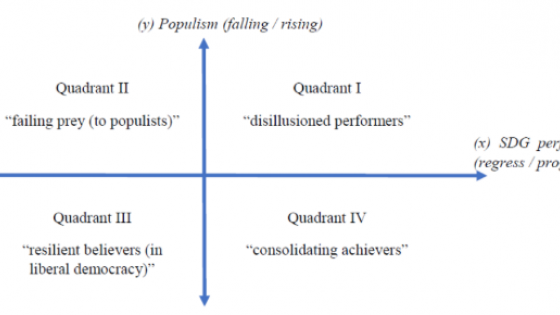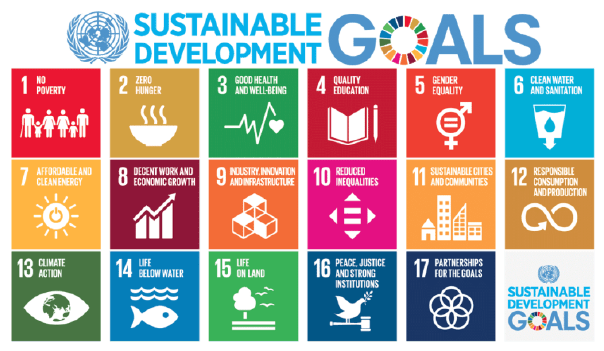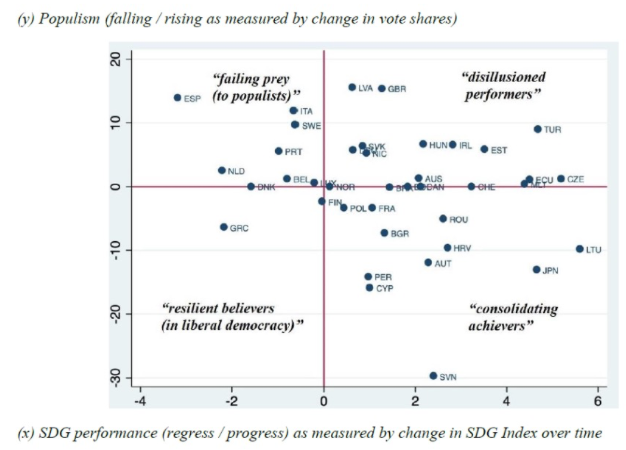This column is a lead commentary in the VoxEU debate on "Populism"
In the academic literature, as well as within the VoxEU debate, a number of reasons for the recent rise of populism have been brought forward (for an overview of the literature, see Norris and Inglehart 2018). However, no study has yet looked systematically at the relationship between the rise of populism on the one hand, and the historic Agenda 2030 for Sustainable Development on the other. To address this gap, we recently introduced the first systematic classification of Sustainable Development Goals (SDG) performance and populism (Kroll and Zipperer 2020). We performed the first empirical analysis of the relationship between populism and the SDGs by examining how countries have progressed on the SDGs over time, and how their development in terms of sustainability relates to subsequent electoral support for populism. We used data from the SDG Index and Dashboards (Sachs et al. 2019 and www.sdgindex.org) which provides “the most comprehensive picture of national progress on the SDGs and offers a useful synthesis of what has been achieved so far” (Nature Sustainability 2018).
Towards a virtuous cycle of SDG progress
The SDGs provide a new and enlarged understanding of sustainability as an economic, social, and environmental challenge. The goals are firmly rooted in the concept of sustainable development, i.e. “development that meets the needs of the present without compromising the ability of future generations to meet their own needs” (Brundtland Commission 1987, Sachs 2015). They comprise 17 goals and 169 targets that span a range of topics, from ending extreme poverty (SDG 1) to affordable and clean energy (SDG 7), or a global partnership for the goals (SDG 17) (UN 2015) (see Figure 1).
Figure 1 The Sustainable Development Goals
Source: UN (2015)
What makes pursuing the SDGs a particularly challenging task is the fact that these goals have, at present, antagonist tendencies among themselves. In other words, there are numerous trade-offs between SDGs, such as between reducing poverty and climate action, which, in the future, will need to be turned into mutually reinforcing synergies in order to achieve a “virtuous cycle of SDG progress” (Kroll et al. 2019). Colleagues and I have performed a first analysis of future interactions for projected SDG trends until 2030 within and between goals. We analysed how trade-offs and synergies have evolved globally in the recent past. We found an alarming inability to overcome certain persistent trade-offs, as well as the deterioration for some SDGs. These findings seriously threaten the achievement of the Agenda 2030 (ibid).
A new Sustainability–Populism Framework
In order to enable a structured and fine-grained interpretation of the nexus between sustainability and populism in future research and policy debate, we have recently proposed a Sustainability–Populism Framework (Kroll and Zipperer 2020, see Figures 2 and 3). It elaborates on the four possible outcomes for the relationship between SDG performance over time, and subsequent electoral support for populism.
Figure 2 The new Sustainability–Populism Framework
Source: Kroll and Zipperer (2020)
- Quadrant I: “disillusioned performers” (SDG improvement, rising populism). The countries named “disillusioned performers” have been making progress towards the SDGs. However, populist parties were able to gather increased support (e.g. by capitalising on potential fear of regress or scapegoating towards minorities).
- Quadrant II: “failing prey (to populists)” (SDG deterioration, rising populism). Countries in this category have been failing to advance on the SDGs, and they are falling prey to populists and the political recipes they propose.
- Quadrant III: “resilient believers (in liberal democracy)” (SDG deterioration, falling populism). Even though the situation with regard to the SDGs has deteriorated over the last years, countries in this group keep their faith in traditional mainstream parties and the solutions they propose to overcome the challenges.
- Quadrant IV: “consolidating achievers” (SDG improvement, falling populism). These countries have been making progress towards the SDGs, and the calls by populists to steer in a different direction are not heeded by voters.
The SDGs as an answer to populism
For illustrative purposes of the framework’s analytical value, we examined data on SDG progress and populist vote shares that were available for 39 countries (SDG progress data for 2010 – 2015). Although, due to a time lag, the raw data sometimes precede that period; populist vote share data represent the change from second-last to last election, with the last election mainly taking place between 2015 and 2018 (for details, see Kroll and Zipperer 2020). Most countries fall into Quadrant I and IV. In other words, while most of the countries examined have experienced progress towards the SDGs, they differ in terms of whether the electorate has subsequently turned to populists or not. A number of countries have also experienced SDG regress, and subsequently seen an increase in electoral support for populists (Quadrant I). Almost no countries can be found in Quadrant III, with Greece being an exception where possibly a disillusionment with populists has meant that voters turned away from them. An additional analysis for each SDG separately can be found in the paper.
As political systems in many nations continue to be faced with growing populist parties, our analysis sheds some light onto examples where mainstream political parties prevailed as unchallenged political hegemons in light of their good performance on economic, social, and environmental SDGs. A particularly promising avenue for future research may be dissecting the political discourses in the countries where populists have triumphed despite progress towards the SDGs being made (Quadrant I: “disillusioned performers”), and what differentiates such a political discourse from that taking place in countries of the other categories, especially the “consolidating achievers” group. In other words: Why does success on the SDGs result in diminishing support for populists in certain countries but not in some others?
In order to further explore the nature of the statistical relationship between the two concepts beyond the aforementioned framework, we also performed a linear regression analysis. We thereby examined the SDG performance over time as a potential determinant of the populist vote share in the subsequent election. We find a significant negative effect of overall SDG country performance over time on the change in populist vote share (controlling for GDP per capita change PPP). For each one-point increase on the aggregate SDG Index (out of 100), the vote share of populist parties on average drops by about two percentage points. We also find significant negative effects of progress in SDG 1 (No poverty), SDG 2 (Zero hunger), SDG 11 (Sustainable cities and communities), and SDG 15 (Life on land). The effect sizes vary as follows. For each one-point increase on the SDG 1 indicator (out of 100), the vote share of populist parties on average drops by about 0.3 percentage points, while for SDG 2 it drops by about 2.4 percentage points. For SDG 11, the drop is by about one percentage point, and for SDG 15 by about half a percentage point.
Figure 3 The Sustainability–Populism Framework with data for 39 countries
Source: Kroll and Zipperer (2020)
Making the SDGs the blueprint for the COVID-19 recovery
As countries are now beginning to organise the recovery after COVID-19, many commentators have expressed concerns that the hardship associated with the crisis might be exploited by populists in numerous countries, potentially leading to a new wave of electoral support for populism. The lessons from recent findings discussed here lend support to the notion that a strong commitment to the SDGs (overall, as well as in particular to the SDGs 2, 11, and 15) could be part of an appropriate and effective answer to populism. The SDGs would therefore be a very suitable blueprint for the COVID-19 recovery.
References
Brundtland, G (1987), “Report of the World Commission on Environment and Development: Our Common Future”, United Nations General Assembly, document A/42/427.
Kroll, C, A Warchold and P Pradhan (2019), “Sustainable Development Goals: Are we successful in turning trade-offs into synergies?”, Palgrave Communications (doi: 10.1057/s41599-019-0335-5)
Kroll, C and V Zipperer (2020), “Sustainable Development and Populism”, Ecological Economics, forthcoming (doi:10.1016/j.ecolecon.2020.106723)
Norris, P and R F Inglehart (2018), Cultural Backlash: Trump, Brexit, and Authoritarian Populism, New York: Cambridge University Press.
Sachs, J (2015), The Age of Sustainable Development, New York: Columbia University Press.
United Nations (2015), “Transforming our world: The 2030 agenda for sustainable development”.






